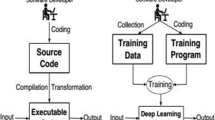Abstract
There are increasingly deep learning approaches being used in software engineering domain. While, there are no agreement on how to adopt deep learning in this new domain. This work presents a methodological framework for deep learning in software engineering. Firstly, this work summarizes how to evaluate deep learning results in software engineering. Secondly, this paper suggest methodological principle that can be used in this new scenario. We construct a methodological framework as a guideline for deep learning research in software engineering.


Similar content being viewed by others
Change history
03 November 2023
This article has been retracted. Please see the Retraction Notice for more detail: https://doi.org/10.1007/s42979-023-02450-4
References
Cico O, et al. Exploring the intersection between software industry and software engineering education—a systematic mapping of software engineering trends. J Syst Softw. 2021;172:110736.
Campero S. Hiring and intra-occupational gender segregation in software engineering. Am Sociol Rev. 2021;86(1):60–92.
Lo SK, et al. A systematic literature review on federated machine learning: from a software engineering perspective. ACM Comput Surv (CSUR). 2021;54(5):1–39.
Giray G. A software engineering perspective on engineering machine learning systems: state of the art and challenges. J Syst Softw. 2021;180:111031.
Bader J, et al. AI in software engineering at Facebook. IEEE Softw. 2021;38:52–61.
De Angelis G, Lonetti F. About the assessment of grey literature in software engineering. Eval Assess Softw Eng. 2021. https://doi.org/10.1145/3463274.3463362.
Lin T, Huang J, Gao J. Flame detection based on SIFT algorithm and one class classifier with undetermined environment. Comput Sci. 2015;42(6A):231–5.
García-Holgado A, et al. Improvement of learning outcomes in software engineering: active methodologies supported through the virtual campus. IEEE Revista Iberoamericana de Tecnologias del Aprendizaje. 2021;16:143–53.
Vayyavur R. Software engineering for technological ecosystems. In: Research anthology on recent trends, tools, and implications of computer programming. IGI Global, 2021. p 598–611
Prechelt L. On implicit assumptions underlying software engineering research. Eval Assess Softw Eng. 2021. https://doi.org/10.1145/3463274.3463356.
Lin T, Gao J. Graphic user interface testing based on petri net. Appl Res Comput. 2016;33(3):768–72.
Fu X, Ma Y, Lin T. A novel image matching algorithm based on graph theory. Comput Appl Softw. 2016;33(12):156–9.
Lin T. Deep learning for IoT. In: 39th IEEE international performance computing and communications conference, 2020
Tao Lin J, Gao XFu, Lin Y. A container–destructor–explorer paradigm to code smells detection. J Chin Comput Syst. 2016;37(3):469–73.
Clarke P, O’Connor RV. The situational factors that affect the software development process: towards a comprehensive reference framework. Inf Softw Technol. 2012;54(5):433–47.
Tao Lin J, Gao X, Fu YM, Lin Y. A novel direct small world network model. J Shanghai Normal Univ. 2016;45(5):566–72.
Lin T, Fu X, Chen F, Li L. A novel approach for code smells detection based on deep learning. In: EAI international conference on applied cryptography in computer and communications, 2021
Fenton N, Pfleeger SL, Glass RL. Science and substance: a challenge to software engineers. IEEE Softw. 1994;11(4):86–95.
Garousi V, Mäntylä MV. When and what to automate in software testing? A multi-vocal literature review. Inf Softw Technol. 2016;76:92–117.
Lin T, Gao J, Fu X, Ma Y, Lin Y. Extraction approach for software bug report. Comput Sci. 2016;43(6):179–83.
Inui K, Abe S, Hara K, Morita H, Sao C, Eguchi M, Sumida A, Murakami K, Matsuyoshi S. Experience mining: building a large-scale database of personal experiences and opinions from web documents. In: Proceedings of the 2008 IEEE/WIC/ACM international conference on web intelligence and intelligent agent technology, vol. 01, pp. 314–321. IEEE Computer Society, 2008
Ivarsson M, Gorschek T. A method for evaluating rigor and industrial relevance of technology evaluations. Empir Softw Eng. 2011;16(3):365–95. https://doi.org/10.1007/s10664-010-9146-4.
Lin T. A data triage retrieval system for cyber security operations center. Pennsylvania State University thesis, 2018
Kitchenham B, Pfleeger SL. Principles of survey research: part 5: populations and samples. ACM SIGSOFT Softw Eng Notes. 2002;27(5):17–20.
Lin T, Zhong C, John Y, Liu P. Retrieval of relevant historical data triage operations in security operations center. In: From Database to cyber security. Lecture notes in computer science, 2018
Kurashima T, Tezuka T, Tanaka K. Mining and visualizing local experiences from blog entries. In: DEXA, p 213–222. Springer, 2006
Lin T, Gao J, Fu X, Lin Y. A novel bug report extraction approach. In: 15th International conference on algorithms and architectures for parallel processing, 2015, pp 771–780
Lakshmanan G, Oberhofer M. Knowledge discovery in the blogosphere: approaches and challenges. IEEE Internet Comput. 2010;14(2):24–32.
Author information
Authors and Affiliations
Corresponding author
Ethics declarations
Conflict of interest
The authors declare that they have no conflict of interest.
Additional information
Publisher's Note
Springer Nature remains neutral with regard to jurisdictional claims in published maps and institutional affiliations.
This article has been retracted. Please see the retraction notice for more detail: https://doi.org/10.1007/s42979-023-02450-4
Rights and permissions
Springer Nature or its licensor (e.g. a society or other partner) holds exclusive rights to this article under a publishing agreement with the author(s) or other rightsholder(s); author self-archiving of the accepted manuscript version of this article is solely governed by the terms of such publishing agreement and applicable law.
About this article
Cite this article
Lin, T., Fu, X. RETRACTED ARTICLE: A Novel Framework in Software Engineering for Deep Learning. SN COMPUT. SCI. 3, 320 (2022). https://doi.org/10.1007/s42979-022-01173-2
Received:
Accepted:
Published:
DOI: https://doi.org/10.1007/s42979-022-01173-2




